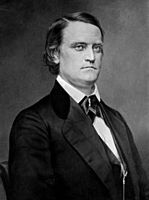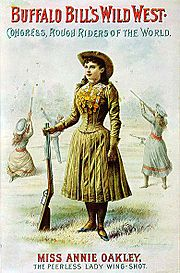The Curse of Abraham Lincoln
by Mustang
Americans today remember Abraham Lincoln as one of their greatest presidents. I completely disagree with such a proposition. The facts of our history leading up to the American Civil War, and those following it, simply do not support such a conclusion.
1860 election
 |
 |
||
| Nominee | Abraham Lincoln | John C. Breckinridge | |
|---|---|---|---|
| Party | Republican | Southern Democratic | |
| Home state | Illinois | Kentucky | |
| Running mate | Hannibal Hamlin | Joseph Lane | |
| Electoral vote | 180 | 72 | |
| States carried | 18 | 11 | |
| Popular vote | 1,865,908 | 848,019 | |
| Percentage | 39.8% | 18.1% |

President Lincoln didn’t start the American Civil War, of course. The road to civil war began long before Lincoln entered politics. No — what started the civil war was a drastic shortage of thoughtful, tolerant, patient men serving in high political offices. Lincoln’s election to the presidency simply galvanized the southern state’s refusal to obey laws passed by Congress that they (the southern states) believed were unjust.
Several markers led to civil war, but ultimately, there were two key issues — their order of importance depending on who one is talking to — state’s rights and slavery.
Slavery. There is no justification for human bondage. It is not only abominably sinful, but it is also a dumb idea. Slavery, as an institution, cannot be economically sustained. The USA was well on the way to abolishing slavery in 1808 when the slave trade was officially outlawed. So, there was no “continuing pipeline” of human slaves coming to the United States after that year.
Even so, maintaining a large number of people in bondage was economically unsustainable. Suppose a planter owned ten slaves: five males and five females. In five years, the grower could end up with forty people in bondage. If one imagines how much it cost to house, feed, and clothe ten people, how much more would it cost to care for 35-40 such persons? In 1800, the slave population in the United States was 894,000; In 1830, around 2-million. Slavery was always a stupid idea, and (or so I believe), slavery would have imploded on its own without emancipation through carnage.
State’s Rights
a. If the founding fathers formed the United States on the notion that the people controlled their government and destiny through the selection of representatives, why would Abraham Lincoln deny the people their “God-given” right to choose their future? The question is significant because I do not believe the American people have ever been “united” in matters of the greatest import.
b. What did the average farmer in Indiana or Georgia know about nullification? My guess is “not much.” But what the average citizen understood about the nullification principle was a matter best left to the states, not the federal government. Either the people were, as stated ad nauseam, empowered to choose their government and destiny, on what basis did Lincoln have to “preserve a union” that (1) never actually existed except on paper, and (2) no longer served the interests of the people?
1. Only about one-third of the American people thought the revolution was a good idea.
2. Hardly any American supported going to war with Great Britain in 1812. Those who did support the war had something to gain from it.
3. The American people did not have any input to the Louisiana Purchase or subsequent territorial expansion — which played an essential part in leading up to the civil war, particularly relating to the admission of states.
c. People today argue that such discussions have no merit because the “matter” has already been resolved. The northern union won the war — the war settled the matter. But has the issue of individual liberty been fixed? Do the American people continue to express their will through their respective state governments? Should the states, therefore, have the most influence on formulating national policy — and the US Congress “less” influence? Shouldn’t the federal government, as set forth in the U. S. Constitution, have limited power over “we the people?”
Let’s test this for a moment. Suppose there had never been a civil war.
a. Six-hundred fifty-thousand Americans would not have lost their lives.
b. There would have been no need for national reconstruction, which was nothing shy of a horrendous experience for southerners and a disaster for the industrialized north, as well. Poor southerners, for example, did not become consumers for northern-made products. It took the American people sixty years to recover from the US reconstruction policies imposed upon the country by “radical Republicans,” men hell-bent on teaching the southern people a lesson they would not soon forget — while concurrently punishing the entire nation. I wonder, too, without reconstruction, would there have been such lawlessness in the old west?
c. Likely, there would not have been a Spanish/American War and no quest for overseas colonies. During the resulting Philippine Insurrection, 300,000 people lost their lives. Another 100,000 people lost their lives during the Boxer Rebellion in China.
d. Would the American people, whether as separated into northern and southern states, or even as diplomatically re-united at some point, have involved themselves in the dreadful affair of World War I? We gave up 120,000 of our young men in World War I; we gave up another 650,000 lives because of influenza brought home to America from Europe by our soldiers (1918-1920).
e. Without American colonialism in the Pacific – an example not lost on the island nation of Japan, who in focusing on United States behavior, embarked on their own version of Manifest Destiny, the Pacific War cost the American people another 388,000 casualties and, in terms of current dollars, $2 trillion.
f. There may not have been a Korean War without American colonial meddling, which cost the American people another 140,000 casualties and another $320 billion.
g. Without American colonial meddling, there would not have been American involvement in the Vietnam War, which cost the American people another 60,000 casualties and another trillion dollars in 2019 valuation.
My questions remain: Was President Abraham Lincoln truly one of our best chief executives? Was he good for future generations of Americans? Should Lincoln have allowed the southern states to “go their own way?” Without such gross expenditures and the loss of so many American lives from colonial adventurism, would the US spend itself silly in 2021? Would we have a “homeless” problem today? Would our tax rates be so high? Would half of our population so quickly embrace communist/socialist policies today?
My guess is that the divided states would have come back together in due course, on a more equitable basis, perhaps, under an improved constitution and one that actually governed the behavior of the federal government. But that’s just me thinking …
What say you?
Mustang also blogs at Fix Bayonets and Thoughts From Afar




